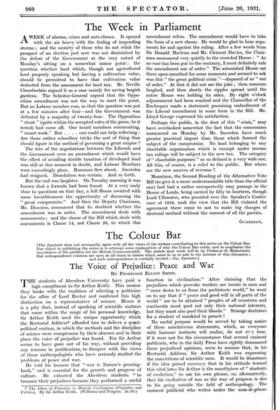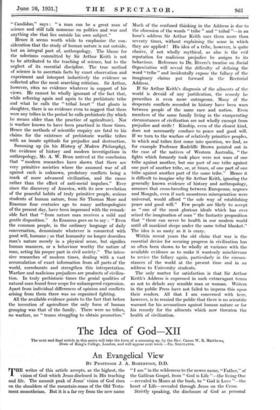The Colour Bar
[The Spectator does not necessarily agree with all the views of the writers contributing to this series on the Colour Bar. Our object in publishing the series is to attempt some explanation of why the Colour Bar exists, and to emphasize the importance of the problem for the British Commonwealth. The article next week will be by Professor B. Malinowski. Our correspondence columns are open at all times to letters which seem to us to add to the interest of this discussion ;
and such correspondence is cordially invited.—En. Spectator.]
The Voice of Prejudice : Peace and War
BY PROFESSOR ELLIOT SMITH.
THE students of Aberdeen University have paid a high compliment to. Sir Arthur Keith. This session they broke with the tradition of selecting_ a politician for the office of Lord Rector and conferred this high distinction on a representative of science. Hence it is a pity that, instead of speaking of scientific matters that come within the range of his personal knowledge, Sir Arthur Keith used the unique opportunity which the Rectorial Address* afforded him to deliver a quasi- political oration, in which the methods and the discipline of science were conspicuous by their absence and in their place the voice of prejudice was heard. For Sir Arthur seems to have gone out of his way, without providing any reasons in justification, to disagree with the views of those anthropologists who have seriously studied the problems of peace and war.
He told his hearers that " war is Nature's pruning- -hook," and is essential for the growth and progress of culture. He exhorted the Aberdeen students " to treasure their prejudices because they performed a useful * The Place of Prejudice in Modern Civilization (Prejudice and Politics). By Sir Arthur Keith. (Williams and-Ncirgate.- function in civilization." After claiming that the prejudices which piovoke warfare are innate in man and " came down. to us from the prehistoric world," he went on to say that if " peace and good will in all parts of the world " are to be attained " peoples of all countries and continents must pool not only their national interests, but they must also pool their bloods." Strange doctrines for a student of mankind to preach !
No useful purpose would be served by taking notice of these mischievous statements, which, as everyone with humane instincts will realize, do not fir; true, if it were not for the circumstance that several eminent publicists, who in the daily Press have rightly denounced these prejudiced opinions, seem to assume that, in his Rectorial Address, Sir Arthur Keith was expressing the convictions of scientific men. It would be disastrous if the idel gitined currency that in his attitude toward this vital issue Sir Arthur is the mouthpiece of" students of evolution," to use his own phrase, or, alternatively, that his exaltation of war as the way of progress is due to his going outside the field - of anthropology. The eminent pUblicist. who writes under the nom-de plume " Candidus," says : " a man can be a great man of science and still talk nonsense. on politics And war and anything else that lies outside his own subject."
Hence it seems worth while to emphasize the con- sideration that the study of human nature is not outside, but an integral part of, anthropology. The blame for the solecisms committed by Sir Arthur Keith is not to be attributed to the teaching of science, but to the neglect of its essential disciOne. The true method of science is to ascertain facts by exact observation and experiment and interpret inductively the evidence so collected after the most searching criticism. Sir Arthur, however, cites no evidence whatever in support of his views. He cannot be wholly ignorant of the fact that, while referring-again and again to the prehistoric tribe and what he calls the " tribal heart " that gloats in slaughter, there is no evidence even to suggest that there were any tribes in the period he calls prehistoric (by which he means older than the practice of agriculture). Nor is warfare known to have been practised in those times. Hence the methods of scientific enquiry are fatal to his claims for the existence of prehistoric warlike tribes with an innate aptitude for prejudice and destruction.
Summing up (in his History of Modern Philosophy), the evidence of history and modern investigations in anthropology, Mr. A. W. Benn arrived at the conclusion that "modern researches have shown that there are very primitive societies where the assumed war of all against each is unknown, predatory conflicts being a mark of more advanced civilization, and the cause rather than the effect of anti-social impulses." Ever since the discovery of America, with its new revelation of the peaceful habits of truly primitive people, serious students of human nature, from Sir Thomas More and Erasmus four centuries ago to many anthropologists of the present day, have been impressed with the remark- able fact that " from nature man receives a mild and gentle disposition." As Erasmus goes on to say : " Even the common people, in the ordinary language of daily conversation, denominate whatever is connected with good will, humane ; so that humanity no longer describes man's nature merely in a physical sense, but signifies human manners, or a behaviour worthy the nature of man, acting his proper part in civil society." The inten- sive -researches of modern times, dealing with a vast accumulation of exact information from all parts of the world, corroborate and strengthen this interpretation. Warfare and malicious prejudices are products of civiliza- tion. In truly prehistoric times the genial qualities of natural man found freer scope for unhampered expression. Apart from individual differences of opinion and conflicts arising from them there was no organized fighting.
All the available evidence points to the fact that before the invention of agriculture the only form of human grouping was that of the family. There were no tribes, no warfare, no " teams struggling to obtain promotion." Much of the confused thinking in the Address is due to the obsession of the words " tribe " and " tribal "—in an hour's address Sir Arthur Keith uses them more than seventy times, without explaining the sense in which they are applied ! His idea of a tribe, however, is quite elusive, if not wholly mythical, as also is the evil reputation for malicious prejudice he assigns to its behaviour. Reference to Dr. Rivers's treatise on Social Organization will reveal the difficulty of defining the word " tribe " and incidentally expose the fallacy of the imaginary claims put forward in the Rectorial Address.
If Sir Arthur Keith's diagnosis of the ailments of the world is devoid of any justification, the remedy he prescribes is even more outrageous. Many Of the desperate conflicts recorded in history have been wars between people of the same race and nation. Even members of the same family living in the exasperating circumstances of civilization are not wholly exempt • from prejudice and strife ! Kinship, even of the closest kind, does not necessarily conduce to peace and good will. If we turn to the warfare of relatively primitive peoples, in which real tribes first come into question, we find, as for example Professor Radcliffe Brown pointed out in the case of the natives of Western Australia, " the fights which formerly took place were not wars of one tribe against another, but one part of one tribe against one part of another tribe, or, at times, of one part of one tribe against another part of the same tribe." Hence it is difficult to imagine why Sir Arthur Keith, ignoring the generally known evidence of history and anthropology, assumes that cross-breeding between Europeans, negroes and Mongols, even if such monstrous miscegenation were universal, would afford " the sole way of establishing peace and good will." Few people are likely to accept as " one of the most glorious ideals which has ever seized the imagination of man " the fantastic proposition that " there can never be health in our modern world until all mankind sleeps under the same tribal blanket." The idea is as nasty as it is crazy.
Within recent years the old claim that war is the essential device for securing progress in civilization has so often been shown to be wholly at variance with the available evidence as to make it wantonly mischievous to revive the fallacy again, particularly in the circum- stances of the world at the present time and in an address to University students.
The only matter for satisfaction is that Sir Arthur Keith's Address is expressed in such extravagant terms as not to delude any sensible man or woman. Writers in the public Press have not failed to impress this upon their readers. All that I am concerned with here, however, is to remind the public that there is no scientific warrant for his accusations against human nature or for his remedy for the ailments which now threaten the health of civilization.











































 Previous page
Previous page